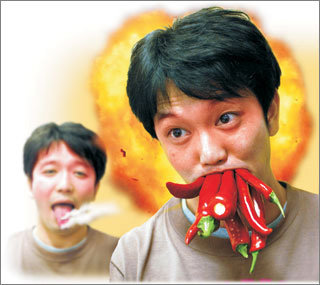Its Super Spicy: Health Report on Spicy Foods
Its Super Spicy: Health Report on Spicy Foods
Posted March. 20, 2005 22:15,

Peoples burning desire for spicy foods, which began last year, has not cooled off. Each restaurant has been eager to exhibit a new spicy menu. Fire chicken, a spicy chicken dish, is still on the top of the popular spicy foods list. In the arena of fast food, competing businesses also have recently introduced hot hamburgers and chicken dishes to their customers.
Is this edible? Its incredibly hot-
At Octopus Street near Moogyo-dong, Jongno, Seoul there is always a crowd of gourmets looking for spicier octopus dishes. Some even say, Is this edible? Its incredibly hot. However, there have always been spicy food lovers.
Due to sweating while having hot food, people often feel a stress release. And, some feel that their heads become more lucid after eating spicy food.
Meanwhile, there are some side effects. Many people suffer twisting pain in their stomachs after having spicy foods. Some even visit a toilet all night or suffer from an enduring stomachache.
There is another worry. It is said that spicy foods damage the stomach and intestines, as well as the liver. Is this trustworthy information?
Wrenching intestines groundless rumors of gastritis and ulcers-
Let me tell it to you straight. People who enjoy spicy foods do not need to worry about getting those ailments. Gustatory cells on the tongue perceive four flavors: sweet, salty, sour, and bitter tastes. They technically do not sense spicy flavors. The spicy flavor is controlled by the cells that cause the sensation of pain. In other words, the brain does not perceive spicy as a flavor, but as a pain.
It is okay with other flavors, but intestines react only for spicy flavors. If the cells that transmit the sensation of pain send signals to the cerebrum, then the brain commands: get rid of the origin of the pain to the stomach and intestines. Then, they become active in performing the movements of relaxation and contraction. This is why people feel wrenching feelings in their stomach and intestines.
The fiery chemicals capsaicin and allicin found in peppers and garlic usually disappear from the stomach within two or three days after intake. Therefore, the heartburn pain goes away along with the source of pain. They never remain in the body and cause no more troubles.
There have been no medical reports that say spicy foods are the cause of gastritis and ulcers. Doctors say, The stomach is such a strong organ. It endures stomach acid that is known to melt iron. Mucosa inside the stomach can not be damaged by spicy flavors.
So the rumors that hot dishes can cause gastritis and stomach cancer are wrong. Rather, the fiery chemicals are known for benefiting the stomach; capsaicin helps reduce inflammation, and allicin functions as a sterilizer.
Better to avoid spicy foods: people with weak stomachs and intestines-
Nevertheless, it is not true saying that spicy foods are beneficial to anybody. Especially people who have lower functioning digestion systems should shun hot dishes. When they have spicy foods, the acid in the stomach can secrete more than the norm. Spicy foods are not direct causes of stomach illnesses, but they can become a hazardous factor.
There are some cases in reality that people who have weak digestion performance sometimes visit emergency rooms suffering from acute ulcer pain right after having spicy foods. For those with weak stomach and intestines, enjoying spicy foods is equal to increasing the possibility of getting stomach ulcers, duodenal ulcers, and other serious diseases.
High blood pressure patients also should restrain themselves from spicy foods. Hot flavors themselves do not increase blood pressure. However, most spicy dishes contain high amounts of salt and sugar to create delicious flavors, which finally function to increase blood pressure.
How to get rid of spicy flavors? Hold warm rice and bread in the mouth-
When people bite into a hot pepper, they often guzzle cold water. But, this does not take away the spicy flavor.
The cerebrum perceives a spicy flavor as pain. Therefore, there should be a way of relieving the pain rather than dealing with it as a flavor. It is recommended that holding warm steamed rice or bread in the mouth for a few seconds, then chewing them and swallowing it. The mechanism behind this is that the sense of warmth reduces the pain and carbohydrates decompose capsaicin. Also, drinking milk or yogurt works. The protein contained in dairy products decomposes capsaicin.
(References: Professor Jeong Hoon-yong, Department of Gastroenterology at Asan Medical Center, and Professor Lee Joon-haeng, Department of Gastroenterology at Samsung Medical Center.)
Sang-Hoon Kim corekim@donga.com







